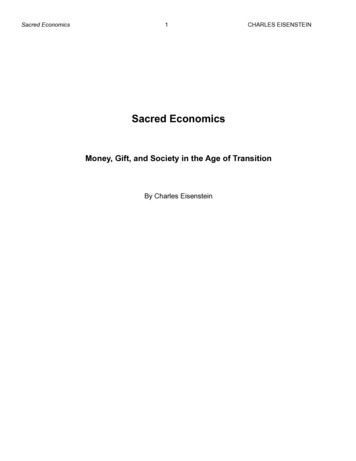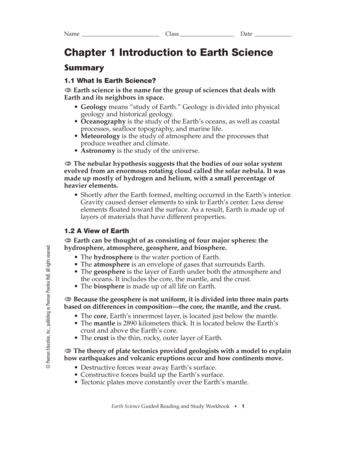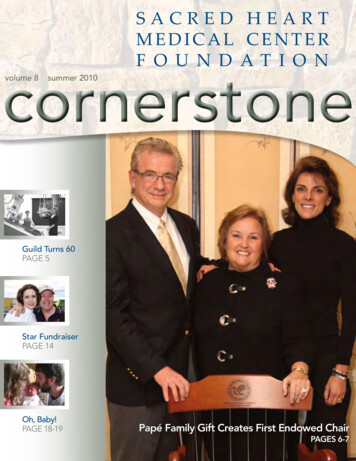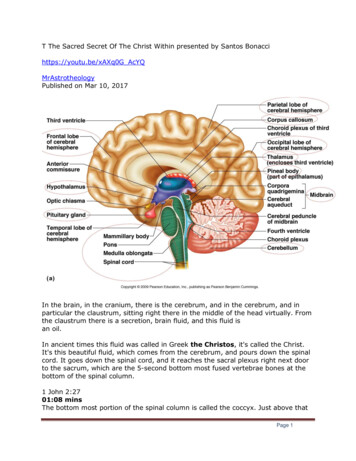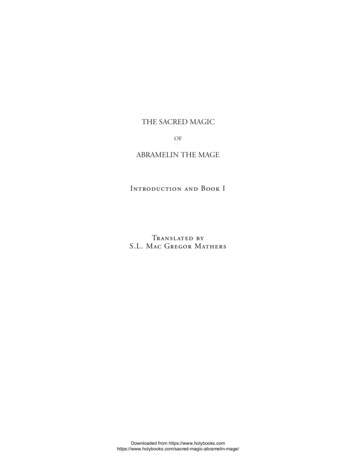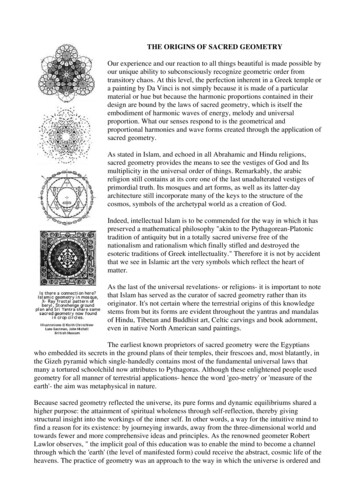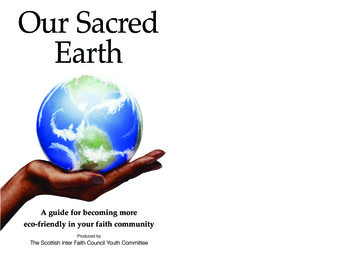
Transcription
Our SacredEarthA guide for becoming moreeco-friendly in your faith communityProduced byThe Scottish Inter Faith Council Youth Committee
Our Sacred EarthCONTENTSThe Scottish Inter Faith CouncilIntroductionWelcome to our guide on how to be more eco-friendly in your place of worship.Contents . 2As humans we rely on the natural resources that the planet offers us in order toIntroduction . 3environment with little thought or care. All faiths teach the importance of caring forEnvironmental Facts . 4Energy . 6Water . 7Buildings . 8Catering . 8Finance . 9Waste . 9survive. For too long people have taken this for granted and have degraded ourthe earth and where better to start than in our places of worship. Through ourfaiths we have the opportunity to care for creation in both a spiritual and practicalsense and as people of faith we can become a powerful force for safeguarding ourworld for future generations.This handbook has been compiled by the Scottish Inter Faith Council youthcommittee in conjunction with Global Xchange volunteers and funded by theScottish Executive through the Sense Over Sectarianism initiative. It offers a simplechecklist to determine how ‘green’ you already are and gives practical advice andsuggestions to help you on your way to better eco practices in areas such asworship, youth activities and ‘housekeeping’. We have also provided usefulwebsites and contacts which have further information to help you achieve yourOutside Space . 10environmental aims.Outreach . 11The Scottish Inter Faith Council Youth Committee is comprised of young peopleWorship . 12Activities . 13Useful Websites and Contacts . 14from ten faith traditions who meet together regularly. Their vision is to promotereligious understanding throughout Scotland by building friendships, hostingconferences, workshops and retreats and by undertaking practical projectstogether – demonstrating that just as the natural world is full of diversity andbeauty so is our human family.Acknowledgements . 15Our SacredEarth.A guide for becoming moreeco-friendly in your faith communityProduced byThe Scottish Inter Faith Council Youth Committee23
Our Sacred EarthThe Scottish Inter Faith CouncilThe state of our sacred earth Climate Change Humans are currently causing irreparable damage to our environment.Scientists predict that due to global warming the planet will heat up bybetween 1.4 and 5.8 C by 2100. Global warming is largely caused byhuman activities such as burning fossilfuels which lead to an increase ofgreenhouse gases, such as carbondioxide, in the atmosphere. Due to the warming of the earth, glaciers, icebergs and polar ice sheets arebeginning to melt. This melting is predicted to cause a rise in sea levels of upto 90 cm in the next 100 years submerging many coastal areas. The UK is responsible for 3% of global emissions despite only having0.009% of the global population. If everyone turned off the standby button on their television Britain would needone less power station. Every week we produce enough rubbish to fill Wembley stadium. In Britain we recycle just 10% of our waste.fossil fuels). We put 70 million tonnes of rubbish into landfill every year.The British government has set a targetWater89% of our energy comes from burningfossil fuel (whereas Sweden use just 40% Ordinary light bulbs can use up to 4 times as much energy asenergy saving bulbs.that, by 2020, 20% of our energy should come from renewable resources. By 2025 it is estimated that two thirds of the world’s population willAt the current rate of change it is expectedsuffer from a lack of water due to rising population and the effects ofthat we will achieve only half that.global warming. Globally we destroy an area of foresttwice the size of Belgium every year.A dripping tap can waste up to 90 litres of water per week.“Nature is God’s Will and is its expression inand through the contingent world”Tablets of Bahá’u’lláh p 142 (The Bahá’í Faith)45
Our Sacred EarthVEHA NEDODUL ERCO SIDNCOThe Scottish Inter Faith CouncilVEHA NEDOEnergyDUL ERCO SIDNCOWaterTurn off appliances e.g. TV, computer screens, lights etc.Fix drips and leaks from water pipes and taps.Move furniture away from radiators to make sure they heat theMake sure your hot water system thermostat is not set too high.room more efficiently.Adding cold water to cool very hot water is wasteful.Keep windows clean and clear to maximise natural light.Measure and monitor the amount of water used.Don’t over fill the kettle – only boil the water you need.Appoint a water monitor within the organisation to undertake periodicClose curtains at dusk to conserve heat.site walk-over to identify water minimisation opportunities.Turn heating down by 1 degree – this can save 8 percentConsider alternative water sources, e.g. collect rainfall from down pipeson your annual energy bills!for use in the garden and grey water re-use.Have meetings at times and in rooms that reduce the need for heating.Make sure people in the place of worship are fully aware of theReplace ordinary light bulbs with energy efficient bulbs.Buy the most energy efficient appliances available.Use a thermostat and time clocks for your heating – there’s no pointoverheating an empty building.Walk or car share to travel to your place of worship.Offset emissions created at your place of worship by fundingtree-planting or energy saving schemes.Monitor energy bills to check trends and savings.importance of water minimization.Ensure people in the place of worship are encouraged to report leaksand that leaks are repaired quickly.Ensure pipes are well insulated to protect against frost damage.Install water-saving devices in toilets e.g. dual or low flush, a toilet hippo,sensor urinal flushing controls, cistern displacement devices.Fit water minimising controls e.g. push button or auto turn off taps, flowregulator/restrictors and spray nozzles on hoses.Change your energy supplier to one that uses green (renewable)energy sources - www.livingethically.comImprove your insulation e.g. loft, cavity, hot water tanks, draftexcluders. Public grants are available for this.Replace your boiler – if it’s over 15 yrs old it’s inefficient.Investigate installing renewable energy sources e.g. solar panels.“Simplicity teaches economy. Simplicity is the conscience which callsupon people to rethink their values. Simplicity decreases the gap between'the haves' and the 'have nots' by demonstrating the logic of true economics:to earn, save, invest, and share the sacrifices and the prosperity.”Living Values A Guidebook; published by Brahma Kumaris World Spiritual6“Our concern for the environment must not be limited solely to ourown region or to the borders of our own country. It is a question whichconcerns everyone on earth”His Holiness Dalai Lama (Buddhism)7
Our Sacred EarthVEHA NEDODUL ERCO SIDNCOBuildings and MaintenanceThe Scottish Inter Faith CouncilVEHA NEDODUL ERCO SIDNCOFinance and PurchasingUse eco-friendly cleaning materials and paint.Purchase recycled equipment and stationary.Choose timber from sustainably managed forests.Have an ethical investment policy for your savings.Use recycled/reclaimed products for building maintenance.Buy fair-trade, organic or more environmentally friendly productsReplace broken or cracked windows to minimise heat losswhere possible.from the building.Use local suppliers – this reduces the need for transportation.Check the environmental policy of your bank – are you satisfied with it?VEHA NEDODUL ERCO SIDNCOCateringUse crockery rather than disposable cups and plates.Buy organic if possible – this reduces the effects of chemicalson the environment.VEHA NEDODUL ERCO SIDNCOWaste MinimisationUse hand towels rather than paper towels in washroom facilities.Recycle or reuse products where possible, for example paper,Use local produce – to reduce the negative environmentalimpact of excessive food miles.Or, if local produce is not an option Use fair-trade products where possible – fair-trade products allhave to meet certain environmental standards in their production.Don’t waste leftover food – there’s probably a local homelessprinter cartridges, plastic bags.Donate leftover food to local homeless shelters.Hold a jumble sale – this a great way to make sure products arere-used and not just thrown away.Compost organic waste if you have a space outside wherecomposting would be possible.shelter that could use it!Recycle plastic, glass and paper materials used in catering.If you serve meat products, provide more vegetarian food. It takes 3times the energy to produce meat as vegetarian products and intensivelivestock farming is also major a source of the greenhouse gas methane.“Are not five sparrows sold for two pennies? Yet not one of“Heaven, earth, and humans are the basis of all creatures. Heaven gives themGospel of Luke 12:6-7 (Christianity)Leading Han Confucian Tung Ch’ung-shu (c.179-104 BCE) (Confucianism)89them is forgotten by God.”birth, earth nourishes them, and humans bring them to completion ”
Our Sacred EarthThe Scottish Inter Faith CouncilVEHA NEDODUL ERCO SIDNCOOutreachPromote fair trade.Advise any users of your place of worship about yourenvironmental policies.Support or initiate community environmental schemes.Support the work of national and international conservation andenvironment organizations such as WWF or Friends of the Earth.Publicise your own or other environmental projects and practicesin your publications / newsletters.Make a link with a community in a developing country. You can thenshare environmental information, best practice and resources.VEHA NEDODUL ERCO SIDNCOOutside SpaceCollect rainfall from down pipes in water butts to use to water plants etc.Plant native species to encourage an abundance of wildlife.e.g. flowers used by bees and butterflies, berry-bearing trees for birds.Provide other features to benefit wildlife e.g. Bird feeders, bird boxes,bat boxes, piles of leaves and old logs for insects, hedgehogs etc.Provide an area for outdoor worship to appreciate our natural worldthrough our faith.Management of outside spaces that is wildlife friendly e.g. minimisinguse of weedkillers, protecting and preserving old trees, hedges, wallsand stones etc.Have an area for compost where members of your community canbring their organic waste – this can then be used to naturally fertiliseyour plants.Make use of recycled materials e.g. reclaimed wood, car tyres etc.“The earth is our mother, and we are all her children”“The world is green and beautiful, and Allah has appointed youhis guardian over it”Ancient Hindu Dictum (Hinduism)Taught the Prophet Muhammad (Islam)1011
Our Sacred EarthVEHA NEDODUL ERCO SIDNOCThe Scottish Inter Faith CouncilSuggested Environmental Activities for Youth GroupsWorship Build and erect a bird feeder.Undertake a study of the ‘environmental’ aspects of your sacred text. Create a compost box – members of your faith group can then bring theirorganic waste for composting.Highlight or preach about creation and protection of the earth during worship.representing the needs of different aspects of nature e.g. seas, forests,Invite a speaker to come and talk about faith and the environment.sky, to help understand the damage humans do to them. For moreFocus on the environment in your youth worship and study groups.Hold devotional services on the theme of environment.Have an environmental day, week or even month where you highlightthe environment both spiritually and practically.Hold a ‘Council of All Beings’ – this is a discussion with different membersinformation visit www.wilderdom.com/games/EnvironmentalActivities Have a scavenger hunt. Plant a garden – native plants or trees would be particularly good forencouraging local wildlife. Or perhaps something like fruit or vegetableswhich can be organically grown! See ‘What lives in our garden?’ – get each member of the group to markout 1metre square of the outside space at your place of worship or a localpark and then look to see what lives in that area for example worms,spiders, bugs. Get members to paint or draw their favourite things in nature. Create a collage to depict good environmental behaviour and badenvironmental behaviour – if possible using natural/reused/recycledproducts. If you are able to access the internet, get members to calculate theircarbon footprint – there are many websites where you can do this forexample www.carbonfootprint.com“When God created the first human beings, God led them around the Gardenof Eden and said: “Look at my works! See how beautiful they are –how excellent! For your sake I created them all. See to it that you do notspoil and destroy My world; for if you do, there will be no one else to repair it.”Midrash Kohelet Rabbah, 1 on Ecclesiastes 7:13 (Judaism)12 Hold or join a tree-planting event. Have an eco-garden design competition. Undertake a practical environmental or conservation project. Encourage your young people to be of service in the community whichmight include environmental activities.“Ye walk on My earth complacent and self-satisfied, heedless that Myearth is weary of you ”Bahá’u’lláh (The Bahá’í Faith)13
Our Sacred EarthThe Scottish Inter Faith CouncilUseful Websites and Contactswww.greenchoices.org – a website with advice for environmental alternativesfor all aspects of day to day living.www.livingethically.co.uk – helpful and practical advice for a more ethical lifestyle.www.adviceguide.org.uk – advice on many topics including environmental living.www.thecarbontrust.co.uk – advice on how to save money and reduce energyconsumption as well as information about climate change. Tel. 01355 581810.www.est.org.uk – information on a wide range of energy saving products.www.saveenergy.org.uk – information about grants for insulation. Tel. 0800 093 4050www.envirowise.gov.uk – contains information about saving water or for theirenvironment and energy helpline Tel. 0800 585794.www.greenstat.co.uk – the website of the Green Stationary Company who providerecycled stationary products. Tel. 01225 480 556.www.recycled-paper.co.uk – providers of recycled stationary products.Tel 01676 533 832.www.eiris.org – for information regarding ethical investments. Tel. 020 7840 5700.www.carbonfootprint.com – a site where you can calculate your carbon footprint.www.climatecare.org - a website that enables you to pay to offset carbon emissionswith forest replanting. Tel. 01865 207 000.www.fairtrade.org.uk – for information about fair-trade products and suppliersWith thanks toEleanor Todd, Eco-CongregationLinda MacDonald, Hidden GardensTel. 020 7405 5942.www.btcv.org – the website for the British Trust for Conservation volunteers.www.ecocongregation.org – Church of Scotland organization to assist their churchesin becoming more eco-friendly.Hannah Clinch, RadiusDanny Lowe, Govanhill GladesPhotos courtesy of www.topfoto.co.ukwww.stopclimatechaos.org - a coalition of groups fighting against climate changeFor information on grants for insulation and installing renewable energy sources contactyour local government via telephone or website.“After God created the earth, He saw that it was good”Genesis 1-3 (Judaism and Christianity)14“Men, trees, pilgrimage places, banks of sacred streams, clouds, fields.Islands, spheres, universes, continents, solar systems. The sources ofcreation, egg-born, womb-born, earth-born, sweat-born, oceans, mountainsand sentient beings. He, the Lord, knows their condition, O Nanak.”Sikh Scriptures (Sikhism)15
If you require this handbook in a language other than Englishor in a larger format please contact the Scottish Inter Faith CouncilThe Scottish Inter Faith Council523, Shields RoadGlasgowG41 2RFTel. 0141 420 6982Email: admin@interfaithscotland.orgWeb: www.interfaithscotland.orgPrinted on eco-friendly paper
A guide for becoming more . If you serve meat products, provide more vegetarian food. It takes 3 times the energy to produce meat as vegetarian products and intensive livestock farming is

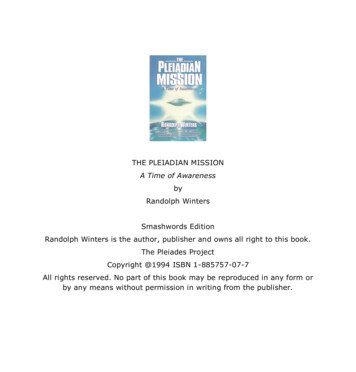
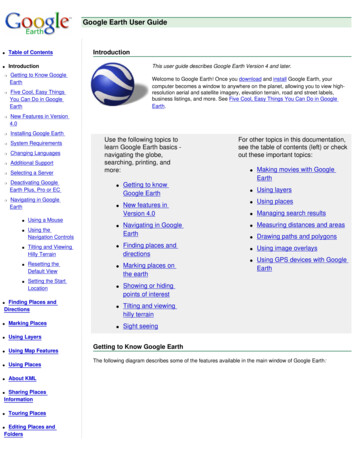
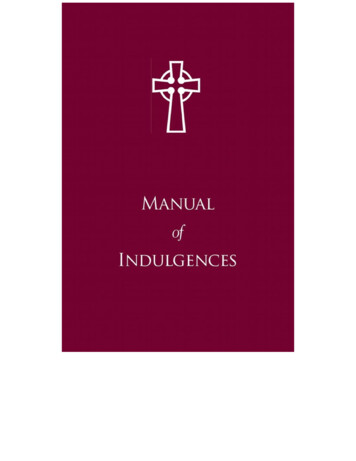
![The Book of the Damned, by Charles Fort, [1919], at sacred .](/img/24/book-of-the-damned.jpg)
